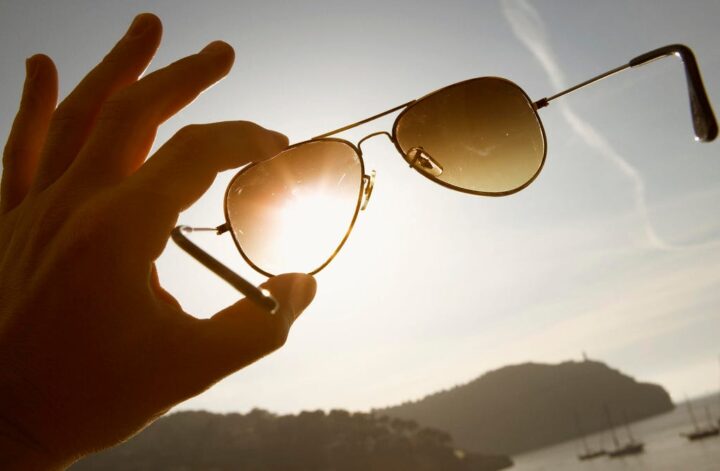Modern glasses come with tons of different lens coatings and treatments to enhance your vision, including blue light filters, polarization and more. One new type of lens treatment is melanin infusion.
Melanin is the pigment that causes your skin to tan and protects it from the sun’s UV rays. The darker your skin, the more natural melanin it has. Melanin also plays a similar role in your hair and eyes — it gives brown and hazel eyes their color and protects the eyes from damage by absorbing light.
Because of its protective properties, some brands are now offering glasses and sunglasses with lenses that have been treated with melanin. That may sound a bit wacky — after all, could wearing melanin in glasses really be effective? On the other hand, a little extra melanin could be helpful for people with lighter eyes, who don’t have as much natural melanin for protection. Think of it like sunscreen for your eyes.
At CNET, we’ve been diving deep into the ins and outs of eye care, separating fact from fiction when it comes to everything from sunglass tints to eye drops. Here’s what we uncovered about melanin-infused glasses.
Melanin and eye health
Melanin is “instrumental in optimizing eye health,” said Dr. Saya Nagori, an ophthalmologist and CEO of EyeFacts. It absorbs several types of light, including kinds that can cause damage or stress over time, like UV light. It’s also an antioxidant, making it “effective in stabilizing free radicals, reducing inflammation and defending against toxins,” Nagori added.
Research also suggests that melanin may help prevent age-related macular degeneration, a common cause of vision loss in older adults.
But not everyone has the same amount of melanin in their eyes. People with blue or green eyes have less melanin, while people with brown or hazel eyes have more, per Medline Plus. According to the Michigan Eye Institute, some eye conditions can also cause a change in melanin levels, like glaucoma. The amount of melanin in the eye may also decrease with age.
How does melanin-infused eyewear work?
Melanin Optics, ESP Eyewear and similar companies that sell melanin-infused eyewear say their products can provide many of the same benefits that natural melanin would provide: protection from UV and blue light, prevention of eye damage, improved comfort and more. (Melanin Optics and ESP Eyewear didn’t respond to a request for comment.)
The idea of melanin-infused eyewear isn’t quite as strange as it sounds. Melanin has been studied in materials science for years. Researchers at McGill University and UC San Diego, for example, have developed synthetic melanin in hopes of using it in sunscreen, while researchers at Northwestern University worked on a synthetic melanin hair dye that would mimic natural hair colors.
As for melanin’s effectiveness in eyewear, though, that’s still up for debate among eye health professionals. There isn’t much research on it yet, and while some experts see melanin as a promising new protective coating, others aren’t quite as convinced.
“The concept of melanin-infused glasses has gained a lot of attention in recent years, with claims that they can support visual comfort, reduce glare, and protect the eyes from harmful light exposure,” said Dr. Johannes Uys, a doctor at Broadgate General Practice. “While the idea is attention grabbing, there’s limited scientific evidence to support these claims.”
Dr. Yuna Rapoport, an ophthalmologist at Manhattan Eye, calls melanin-infused glasses a “marketing ploy.”
Nagori, on the other hand, points to studies on synthetic melanin’s effectiveness against UV light, and the important role of melanin in eye health overall. “The conclusion I have drawn from this is that melanin infused glasses can be beneficial for eye health,” she said.
Still, she recommends consulting with an eye doctor before you buy a pair, and being careful where you buy them. “Just because the lenses [are] tinted, doesn’t mean they’re infused with melanin, and unscrupulous individuals may claim this just to bump up their prices,” she said.
Lastly, Nagori shared that melanin degrades over time, so it might be worth replacing melanin-infused lenses regularly.
Other ways to protect your eyes
Whether or not you choose to try melanin-infused glasses, there are other ways to protect your eyes from damage over time.
When it comes to sun protection, try wearing glasses with a UV protection coating. Look for a pair with 100% UV protection for the best results. Tinted sunglasses can minimize glare on sunny days and help your vision in other ways, depending on the color. And polarized or anti-reflective coatings also filter light to reduce glare and eye strain.
The evidence is mixed as to how dangerous it is for your eyes, but it can also affect your sleep for the worse. Blue light blocking glasses are available to help minimize those effects. Rapoport also recommends using apps that reduce the amount of blue light on your devices, rather than buying special glasses.
Practicing good eye hygiene in general is also key for maintaining your eye health long-term. Most importantly, don’t neglect to get your annual eye exam so that any issues can be caught early and treated.
